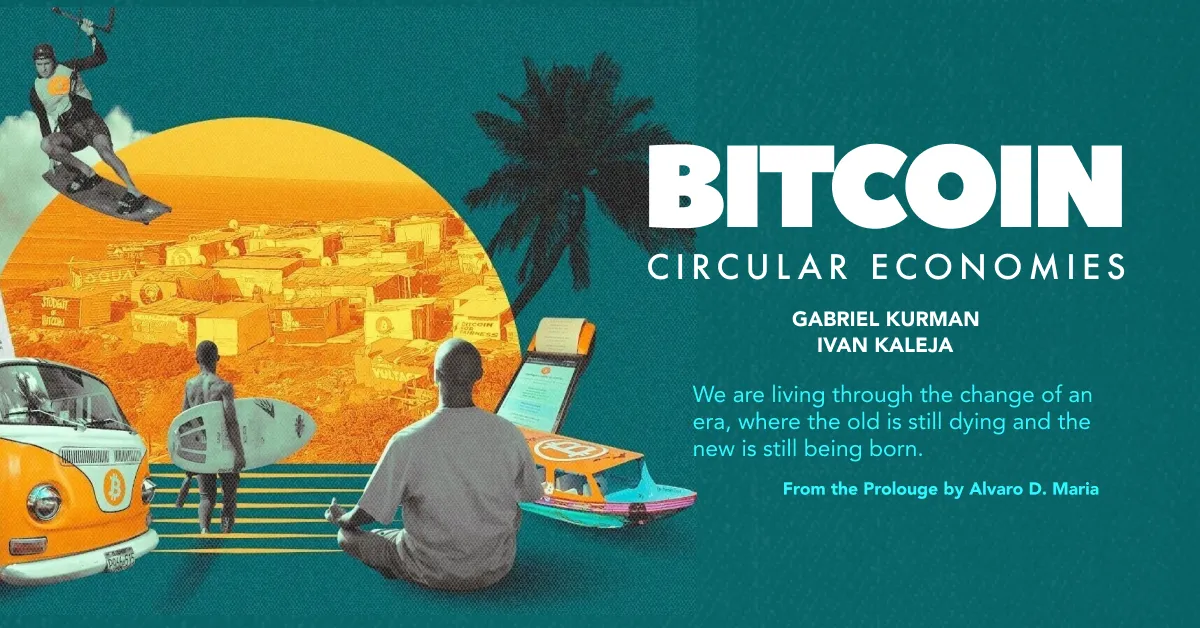Bitcoin Magazine

An Excerpt from Bitcoin Circular Economies: Prologue
We are living through the change of an era, where the old one is still dying and the new one is still being born. We are living through the end of the industrial era, when prosperity came mainly from factories and the cities that fed them with workers. States played an essential role there, providing access to raw materials for the factories, guaranteeing trade routes and infrastructure for their goods and keeping the workers’ movement in check. In return, the factories, thanks to their scale of production, supplied the markets and could afford to pay the states their dues in the form of taxes.
We are now in the middle of the transition to the information age, where scale no longer rules, but personalization. Thanks to the internet, we can aggregate demand and connect with a tailor-made offer, which allows us to produce or provide very specific services and add value in an innovative way. It is no longer necessary to produce to scale to fill the big car showcases; now you order the car the way you want it on a website. Customization is reshaping economic relations, and with it, the world.
With the success of the industrial era, large financial centers were developed, and the regions of the world that were left out of these processes were literally abandoned, cut off from the world’s value chains, unbanked and without access to products and services. But thanks to the internet, more and more regions are emerging from this isolation, and thanks to bitcoin they are also beginning to surface from this economic-financial disconnection.
Many of these regions used to live on remittances sent by their relatives from abroad, with which intermediaries made a great business from the lack of alternatives. Without investment, without capital, without effective quality property, without connection to global value chains, without the possibility of industrialization, these regions were condemned to poverty and marginalization.

Since Bitcoin, together with the internet, more than 1.8 billion people have been able to join the global value chains for the first time, in an era in which personalization and authenticity are precisely what bring the most value. The state as an institution begins to fade away and takes a backseat; meanwhile, the local connects with the global, highlighting its authenticity and personality.
Bitcoin and the internet allow anyone with access to a cell phone to join that global conversation of bits, showcase themselves in the world’s storefront and join value chains around the globe.
In this new era, communities that had been isolated in the industrial era are being reborn: They can now provide services, they can show the world what they are, what they do, and participate in the value creation of trade. The personality of the local attracts the curious and adventurous ones. Personalized communities that are developing as Bitcoin Circular Economies are the best example of this and serve as the seed of the future.
The Role of Bitcoin
Bitcoin is much better understood when we think of it as a global immutable system of absolute property rights — with an underlying real asset that closely resembles a kind of digital gold. When we look at it this way, we realize that private property rights have been instituted worldwide and anyone can own and transmit value without anyone else being able to stop or prevent it — even, with the right measures, not even know about it. This does not only affect payments, but also remittances, donations, savings, inheritance and guarantee contracts. At a stroke, Bitcoin, by introducing a new domain that crosses and covers all the borders of the world (cyberspace), establishes an effective ownership without limits or restrictions. This necessarily leads to the emergence of new ways of relating economically and exchanging value. The connection of the local with the global occurs precisely there: The nexus of local communities with the internet and Bitcoin has no limits. Donations, remittances, ways of providing services around the world, even teleworking, ways of hosting citizens — even granting residence permits in exchange for deposits in multi-signature accounts.
There is a whole world to be explored that will be built on Bitcoin and the local!
Bitcoin Circular Economies demonstrate precisely this: How Bitcoin, despite being global, does not go with globalism, but with connecting the local and the global. Its personality, as opposed to the impersonal and homogenizing of states, conquers the new domain of cyberspace. In these stories of Bitcoin Circular Economies we see precisely the foundations of the future. The birth of millions of people who can incorporate and provide services to the whole world, welcome tourists and other types of visitors to enjoy their communities and learn to live like them. To begin to live those lifestyles outside the unbridled world of the industrial and financial era.
Bitcoin Circular Economies: The Future
These initiatives are gaining weight and popularity, and new ways of living will emerge in different states. As these communities grow, they will also have to evolve into political communities. And it is critical that this vision be adopted by them. The move toward becoming personalized jurisdictions will give them an immense qualitative leap to bring value to the world in a unique way. That will be the guarantee to maintain their authenticity and lifestyle.
States are the first ones that should be interested in promoting this type of initiative, because just as it was important in the 20th century to be a productive power, today it’s important to be able to attract talent by offering a friendly jurisdiction and a better lifestyle than the one offered by today’s world. Education will play a fundamental role in this whole process, as it will sow the soil and fertilize it so that it can prosper. The influence of these communities in the different countries will be of great benefit to all — as reflected in the relationship between El Zonte and El Salvador, which has borne so much fruit for the country.
The big mistake to avoid is to see Bitcoin as the foundation of these communities. Bitcoin is the tool, not the foundation. Just as gunpowder made us stop living in walled cities, but did not build gunpowder-cities, neither should we make that mistake with Bitcoin. The foundation of these new communities must be authenticity and the relentless pursuit of being better.
Undoubtedly, the emergence of Bitcoin Circular Economies is a very important step in the right direction. They move toward personalized jurisdictions that are able to connect the local with the global, not only in an economic way, but in a political way. That is the great challenge of the future. I am convinced that these stories will inspire the world. Bitcoin is the hope and the cornerstone to build a new world — a world that is already beginning to dawn.
Discover more in Bitcoin Circular Economies
This excerpt is just the beginning. Dive deeper into how Bitcoin is transforming communities worldwide in Bitcoin Circular Economies. The e-book is available now, and the paperback is open for pre-order for only $21 for a limited time.
This post An Excerpt from Bitcoin Circular Economies: Prologue first appeared on Bitcoin Magazine and is written by Alvaro D. Maria.















Dodaj komentarz